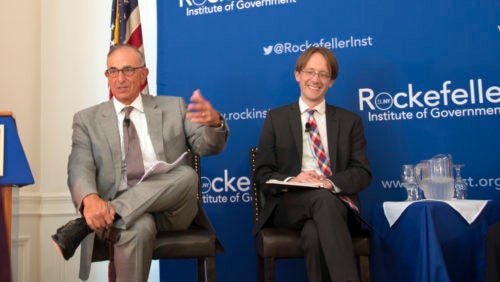Scott Fein (L’75) & Andy Ayers (L’05): A New York State of Rights
August 30, 2018

Two generations of Georgetown Law graduates: Scott Fein (L’75), now chair of the advisory board of the Government Law Center at Albany Law School and senior advisor to the Rockefeller Institute of Government's Center for Law & Policy Solutions, and Andrew Ayers (L’05), now assistant professor and director of the Government Law Center at Albany Law School, discuss the roles that state constitutions can play in the era of a shifting Supreme Court at a Rockefeller Institute forum in July.
Thirty years separate their law degrees, but Scott Fein (L’75) and Andy Ayers (L’05) share a philosophy — and a project.
Vietnam and Watergate were current events when Scott Fein (L’75) was a Georgetown Law student, and it seemed to him the school “was the center of the universe,” he says.
Andy Ayers (L’05) arrived a generation later, one year into the War on Terror. Ayers had been working for Human Rights Watch and was in the Empire State Building on September 11, 2001; he was interested in policy making and saw Georgetown as a tool to sharpen his effectiveness.
Today, both men have traded the nation’s capital for the New York capital. Ayers is director of the Government Law Center, a think tank at Albany Law School, while Fein, a partner at Whiteman Osterman and Hanna, chairs the center’s Board of Advisors.
Together, they are the most public faces of the center’s “Dual Constitutions” project, designed to educate New Yorkers about the considerable protections offered by the state constitution — particularly in the areas of immigrants’ rights, aid to the poor, reproductive rights, criminal law, public education, health care and environmental protection.
While the project is nonpartisan, both Fein and Ayers acknowledge that it was spurred in part by a perception that federal protections are being rolled back in many of those areas.
“We aren’t trying to weaponize (the state constitution),” Fein says. “We’re simply saying that if you’re here, you’re wrapped in all of our rights, liberties and entitlements.”
Fein and Ayers met in 2016, when Ayers interviewed for the post at Albany Law.
He had worked in the New York Solicitor General’s office since 2007, after clerking for then-Second Circuit Judge Sonia Sotomayor and U.S. District Judge Gerald Lynch in Manhattan, and was impressed by Fein’s “incredible exuberance and energy,” as well as his range and connections.
“Beyond his knowledge of the state constitution, he knows everybody in Albany,” Ayers says. “Having him as the chair of our advisory board shows the reach of the Georgetown network, even long after graduation, even far from D.C.”
Fein had counseled two New York governors before going into private practice in 1983 and remains active on state advisory boards. He has been honored for his pro bono work for the ACLU, most notably the SUNY Oneonta case (the longest litigated civil rights case in American history, recounted in the documentary “Brothers of the Black List”), which led New York’s highest court to recognize a right to sue the state for its employees’ constitutional torts.
He credits much of his philosophy to Georgetown Law and to professors like Sherman Cohn (F’54, L’57, LL.M.’60) and Nathan Lewin, an adjunct who taught constitutional law. “At the time, the concept of tikkun olam — a Hebrew phrase for ‘repairing the world’ — was emphasized, if not in word, then in deed,” Fein says. “Georgetown was unambiguous about the importance of making things better.”
In Ayers, he recognized a kindred spirit.
“Andy and I shared the same experience — a Georgetown Law education that allowed us to appreciate the law as the most effective vehicle for protecting fundamental rights and promoting social change,” Fein says. “His commitment to public service was reminiscent of so many of my colleagues at Georgetown, 30 years earlier — and as it turns out, he had been mentored by a good friend of mine.”
That friend was Professor Philip Schrag, who had invited Ayers to join the Public Interest Law Scholars program.
It was Schrag “who told me, ‘think about the states,’” Ayers says. “In D.C., it’s easy to lose sight of the importance that state and local governments can have in people’s lives. Because it’s smaller, you can make a big difference, a lot sooner.”
Other professors — among them, Peter Edelman, Girardeau Spann and Julie O’Sullivan — also emphasized real-world consequences of legal decisions but one comment by Schrag “really drove the point home for me,” Ayers says.
“In Civil Procedure, discussing a case, he said, ‘I was wondering why the lawyers did it this way — so I called them,’” Ayers says. “That blew my mind — that you could do that. That this was not just a page in a book, but real life.
“That’s a big part of what I try to convey to my own students, now,” he says. “That this is happening in the real world, and you can get yourself involved.”